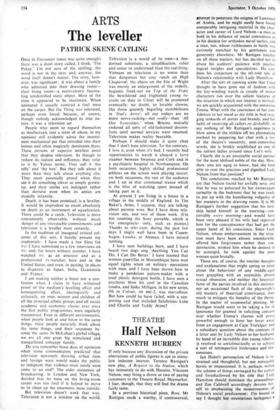ARTS
The leveller
PATRICK SKENE CATLING
Once in Encounter (once was quite enough) there was a short story called, I think, 'The Pukey.' I'm not sure of the spelling; the word is not in the OED; and, anyway, the word itself doesn't matter. The story, how- ever, was significant: it was about a family who admitted into their drawing room— their living room—a malevolently fascina- ting unidentified static object. Most of the time it appeared to be inanimate. When animated it usually vomited a foul mess on the carpet. But the Thing was tolerated, perhaps even loved, because, of course, though nobody acknowledged its true na- ture, it was a television set.
People who seem to regard themselves as intellectuals (not a term of abuse, in my opinion) still evidently adore the inconti- nent mechanical pet that intruded into their homes and often magically dominates them. These persons of superior intellect insist that they despise television. As though to reduce its stature and influence, they refer to it by Yahoo terms. They call it 'the telly' and 'the box'. But they talk about it more than they talk about anything else. They seem parentally proud when they see it do something clever or simply grown- up, and their smiles are indulgent rather than derisive even when its antics are stupidly infantile.
Death, it has been promised, is a leveller. It would be imprudent to count absolutely on death as an instrument of equalization. There could be a catch. Television is more conveniently observable, without much danger of any irrevocable commitments; and television is a leveller most certainly.
In the tradition of inaugural critical col- umns of this sort, I hereby present my credentials: I have made a few films for Tv; I have submitted to a few interviews on Tv; and, for hours without number, I have watched TV, a,s an amateur and as a professional Tv-watcher, here and in the United States, and even, in passing, in places as disparate as Japan, India, Guatemala and France.
I am making neither a boast nor a con- fession when I claim to have witnessed proof, of the medium's levelling effect and homogenizing effect, ideologically and culturally, on men, women and children of all the principal ethnic groups and all social, academic and economic classes ever since the first public programmes were regularly transmitted. Even in different environments, when people look at and listen to the same things, these people naturally think about the same things, and their responses be- come the same. In McLuhan's global village, we are all one great big stimulated and tranquillized unhappy family.
Do you remember those days of optimism when some commentators predicted that television newsreels showing urban riots and foreign wars would make the public so indignant that violence must surely soon come to an end? The elder statesmen of broadcasting, in London and New York, decided that no mess on the living-room carpet was too foul if it helped to move us to clean up the enormous mess outside.
But television doesn't work that way. Television is not a window on the world.
Television is a world of its own—a deo- dorised substitute, a simplification, tidier and easier to understand than the real thing. Vietnam on television is no worse than that dangerous but cosy ranch on High Chaparral; the chaos on the Isle of Wight was merely an enlargement of the orderly, hygienic freak-out on Top of the Pops; the bewildered and frightened young re- cruits on duty in Ulster will be promoted eventually, no doubt, to lovable clowns, like those quaintly beguiling stumblebums in 'Dad's Army': all our todays are no more nerve-racking—not really—than 'All Our Yesterdays,' when Britons stoically endured all sorts of old-fashioned discom- forts until normal services were resumed. Television makes reality bearable.
Perhaps I should make it quite clear that I don't hate television. To the contrary, I love it, even when it's bad. I recently had opportunities to watch it aboard a ferry steamer between Swansea and Cork and in a psychiatric hospital in Northampton. On both occasions, highly skilled professional athletes on the screen were playing soccer; on both occasions, the rest of the audience and I sat in that communal trance which is the bliss of watching sport instead of taking part in it.
At present I am living in a house in a village in the middle of England. In The Baker's Arms, I suppose, they are talking about parsnip wine. But I have three tele- vision sets, and two of them work. (I'm not counting the Sony portable, which is for emergencies only, such as picnics.) Thanks to tele. ision, during the past few days I might well have been in Copen- hagen, Lusaka, or Amman. I have missed nothing.
I have seen buildings burn, and I have heard two dogs sing 'Anything You Can Do, I Can Do Better.' I have learned that women guerrillas in Mozambique have won equal rights when on military operations with men, and I have been shown how to make a pendulum pattern-maker with a used plastic detergent bottle. I have seen a psychotic blow his cool in the Canadian tundra, and Spike Milligan, in his new series, Oh in Colour, on BBC-2, was marvellous. But how could he have failed, with a sup- porting cast that included Salubrious Lane and Charlie and Teddy Atom?






































 Previous page
Previous page